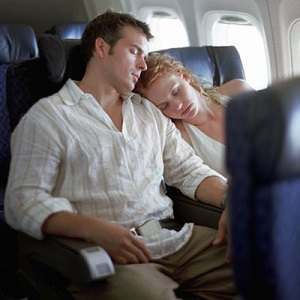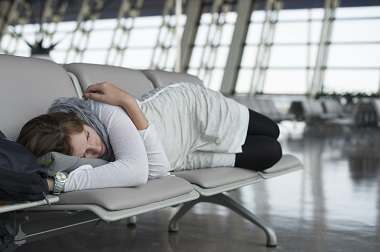Lose Weight Travelling by Beating that Binge Due to Jet Jag
Have you ever observed that jet lag can make you very hungry as well as exhausted? Now scientists have an answer for the reason why you overeat when you are on vacation. When you travel the bacteria that is present in your belly decreases. New studies have discovered that the microbiome in your belly which is the group of bacteria that live within your body and is supposed to aid you with all of your issues from mood to digestion, lives under a schedule.
 Once you disrupt the body’s circadian rhythm you disrupt your flora of your gut. When the bacteria isn’t pleasant, nobody is pleasant. But is also causes you to gain weight.
Once you disrupt the body’s circadian rhythm you disrupt your flora of your gut. When the bacteria isn’t pleasant, nobody is pleasant. But is also causes you to gain weight.
This stands to reason why people who have their sleep cycles disrupted constantly or continually often times end up with obesity or other complications with your metabolism.
Hopefully this discovery might lead to a way to treat these problems in the future, whether they are medical or behavioral if they are trying to deal with crazy schedules. Treating these issues may help people with these problems stay healthy by trying to keep their microbiome healthy.
While you are trying, here are some things to try to diminish the symptoms caused by jet lag or other things that cause sleep cycles to be different from the norm.
1. Keep things simple. The primary thing that you might do to help yourself would be to keep things as easy as possible. Don’t do something that doesn’t need to be. Try to reschedule large meeting, don’t have any big parties, stay away from sugar and try not to eat large meals until the body can adjust to the local time zone. Your adjustment time is different for everyone for you should really know how your body reacts to the time zone changes. People react differently and can handle sleep deprivation better than others can.
 2. Drink lots of water. Drink as much water as you can so you can stay well hydrated while on the airplane. Don’t eat much and try to eat frequently so your digestive tract will keep moving and not be overtaxed. Try to take small naps. Also get your flu shot if it’s the proper time of the year.
2. Drink lots of water. Drink as much water as you can so you can stay well hydrated while on the airplane. Don’t eat much and try to eat frequently so your digestive tract will keep moving and not be overtaxed. Try to take small naps. Also get your flu shot if it’s the proper time of the year.
3. Exercise may be the answer. Make sure you are ready for your trip by having an exercise routine in place so you will stick with it during your travels. Try to walk soon upon your arrival and hopefully take it outside where you can be exposed to light and hopefully the sun will be out. Ordinary sunlight may be the most important tools we may have to reset our clocks.
4. Think about taking probiotic supplements. This will fortify the immune system if you take them while you are on your trip. It might be good for traveler’s tummy. More research should be done to support this connection between jet lag and weight, but you may as well take the supplement because it won’t hurt and should most likely help.

 Subscribe Now
Subscribe Now

 Actually, there are a few things that can be done to help conquer jet lag. Six tips are here that you can try for controlling jet lag naturally.
Actually, there are a few things that can be done to help conquer jet lag. Six tips are here that you can try for controlling jet lag naturally. 4. Go outdoors- In order for your body to adjust with a new time period, you should get out first thing for some sun. Sunlight has an effect on your internal sleep cycle so if you should get as much sunlight as you can.
4. Go outdoors- In order for your body to adjust with a new time period, you should get out first thing for some sun. Sunlight has an effect on your internal sleep cycle so if you should get as much sunlight as you can.



 Our internal clock is located in the lower part of the brain called the hypothalamus. This organ gets signals from eyes that tell it whether it is dark or light. Hormones are released based on that information that will make you sleepy or alert. Melatonin gets released when it is dark. An increase in melatonin will cause you to be sleepier. If you turn on the lights you can quickly stop the release of melatonin.
Our internal clock is located in the lower part of the brain called the hypothalamus. This organ gets signals from eyes that tell it whether it is dark or light. Hormones are released based on that information that will make you sleepy or alert. Melatonin gets released when it is dark. An increase in melatonin will cause you to be sleepier. If you turn on the lights you can quickly stop the release of melatonin.


 Find when breakfast time is at your destination and then begin your diet for the allotted amount of days before you arrive. Caffeinated drinks or alcohol should only be drank between three and five. Eat all meals at their regular time. On the first day eat a diet that includes a breakfast and lunch high in protein and a dinner high in carbohydrates.
Find when breakfast time is at your destination and then begin your diet for the allotted amount of days before you arrive. Caffeinated drinks or alcohol should only be drank between three and five. Eat all meals at their regular time. On the first day eat a diet that includes a breakfast and lunch high in protein and a dinner high in carbohydrates.



 Most likely you have an idea what is the cause of your fatigue. You may be able to put vitality back into your life by making just a few easy changes in your lifestyle. Think about these ways you may be able to increase your level of energy.
Most likely you have an idea what is the cause of your fatigue. You may be able to put vitality back into your life by making just a few easy changes in your lifestyle. Think about these ways you may be able to increase your level of energy.

 1. If you are a person with a rigid schedule you need to change your eating and sleeping habits prior to traveling. Try to be more flexible a few weeks before your expected date of departure.
1. If you are a person with a rigid schedule you need to change your eating and sleeping habits prior to traveling. Try to be more flexible a few weeks before your expected date of departure. 9. Set your clocks and watches to your new destination time once you arrive at the airport. This will begin to mentally prepare you for your new time zone.
9. Set your clocks and watches to your new destination time once you arrive at the airport. This will begin to mentally prepare you for your new time zone.
 Your condition before flying
Your condition before flying Alcohol is two or three times stronger when you are flying than when you are on land. That means that one glass of an alcoholic beverage will affect you like you had two or three. It is very easy to end your flight feeling quite hungover which will make the problems of jet lag much worse.
Alcohol is two or three times stronger when you are flying than when you are on land. That means that one glass of an alcoholic beverage will affect you like you had two or three. It is very easy to end your flight feeling quite hungover which will make the problems of jet lag much worse.
 Most people just assume the first day of your vacation after a long flight will be worthless because of jet lag. Don’t sell yourself short. Many people can enjoy productive first days and may even be hyper. You can’t stop jet lag from happening but if you follow these guidelines you can lessen the symptoms.
Most people just assume the first day of your vacation after a long flight will be worthless because of jet lag. Don’t sell yourself short. Many people can enjoy productive first days and may even be hyper. You can’t stop jet lag from happening but if you follow these guidelines you can lessen the symptoms. Think about well-known
Think about well-known